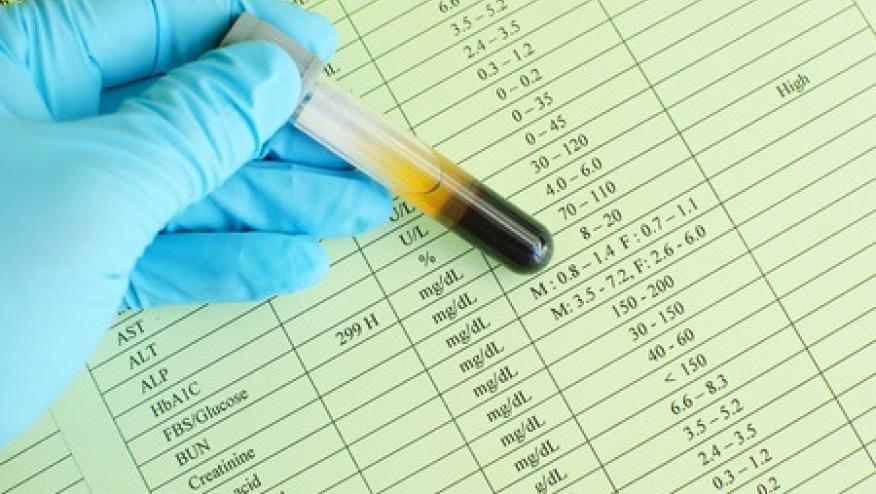Risk Score Predicts Thrombosis Recurrence in APS Save

A combination risk score helped predict recurrent thrombosis -- particularly arterial -- among patients with antiphospholipid syndrome (APS), an international study found.
Among a large cohort of APS patients, adjusted Global Antiphospholipid Syndrome Scores (GAPSS) were 7.8 for those who had any recurrent thrombotic event compared with 6 for those without recurrences (P<0.05), according to Savino Sciascia, MD, PhD, of S. Giovanni Bosco Hospital in Turin, Italy, and colleagues.
And in a subgroup analysis, scores were even higher, at 8.1 (P<0.05) for those with recurrent arterial events, they reported in Seminars in Arthritis & Rheumatism.
"This study, performed within the APS ACTION [Alliance for Clinical Trials and International Networking] International Network, supports the idea that 'the higher the GAPSS values, the higher the thrombotic risk,'" Sciascia told MedPage Today.
"The GAPSS has the potential to improve the clinical management by monitoring the thrombotic risk for each patient during follow-up in a quantitative way," he said.
GAPSS, which incorporates cardiovascular risk factors and the antiphospholipid antibody profile, was initially developed and validated in a large cohort of lupus patients, and then in a cohort of patients with APS but without associated lupus.
APS ACTION is a large web-based research network of patients with antiphospholipid antibodies, requiring a positive lupus anticoagulant test and/or medium-to-high titer anticardiolipin antibodies and/or anti-β2 glycoprotein 1 (aβ2GP1) antibodies. This network provided an opportunity to further validate GAPSS and assess its clinical utility in a large population of patients with APS, whether or not they have accompanying autoimmune disease.
At enrollment, demographic, clinical, and laboratory data were collected, along with cardiovascular risk factors including smoking, hypertension, hyperlipidemia, and diabetes.
The GAPSS was calculated for each patient, adding points for individual risk factors: one point for arterial hypertension, three points for hyperlipidemia, four each for aβ2GP1 antibodies and a positive lupus anticoagulant test, and five for anticardiolipin antibodies.
The analysis included 379 patients who had at least one confirmed episode of thrombosis. In 40%, the thrombosis was arterial, in 53%, it was venous, and 7% had a history of both.
Patients' mean age was 47, and 70% were women. Arterial hypertension was present in 32%, hyperlipidemia in 26%, diabetes in 5%, and a history of smoking in 27%. Lupus anticoagulant was present in 62%, anticardiolipin antibodies in 42%, and aβ2GP1 antibodies in 27%, while all three types of antiphospholipid antibodies were present in 14%.
Recurrences were seen in 29% overall, with 27% of these being arterial only and 58.6% being venous only; in 14.4%, recurrences of both occurred.
"These findings are in line with the concept that [positivity for] antiphospholipid antibodies is a necessary but insufficient step in the development of thrombosis, where a 'second hit' probably pushes the hemostatic balance in favor of thrombosis by including added factors necessary for its development such as uncontrolled traditional cardiovascular risk factors," the researchers explained.
"Some patients can be asymptomatic antiphospholipid antibody carriers for many years, with an estimated thrombotic risk of 0% to 5.4% per year," said co-author Danieli Andrade, MD, PhD, of the University of Sao Paulo in Brazil.
The second hit typically is infection, trauma, surgery, immobilization, pregnancy, and exogenous estrogen exposure, but "not all patients seem to follow this rule, and this is one of the mysteries of this challenging disease," Andrade told MedPage Today.
As expected, the individual risk factors evaluated separately were not predictive. However, the risk factors do increase thrombotic risk in a predisposed patient, and should be modified in asymptomatic individuals, he stated.
While the use of a risk stratification tool is not intended to be a substitute for clinical judgment, the researchers concluded that "The combination of accessible tools for risk stratification such as GAPSS and the APS ACTION scientific networking collaborative efforts could aid in the management of APS patients, as more accurate identification of those at higher risk for thrombotic events could provide a basis for tailored therapeutic approaches."
A study limitation was its retrospective cross-sectional design.
Sciascia and Andrade disclosed no relevant relationships with industry. A co-author disclosed support from the NIH.
Primary Source Seminars in Arthritis & Rheumatism: Radin M, et al "The adjusted global antiphospholipid syndrome score (GAPSS) and the risk of recurrent thrombosis: Results from the APS ACTION cohort" Semin Arthritis Rheum 2019; DOI: 10.1016/j.semarthrit.2019.04.009.










If you are a health practitioner, you may Login/Register to comment.
Due to the nature of these comment forums, only health practitioners are allowed to comment at this time.